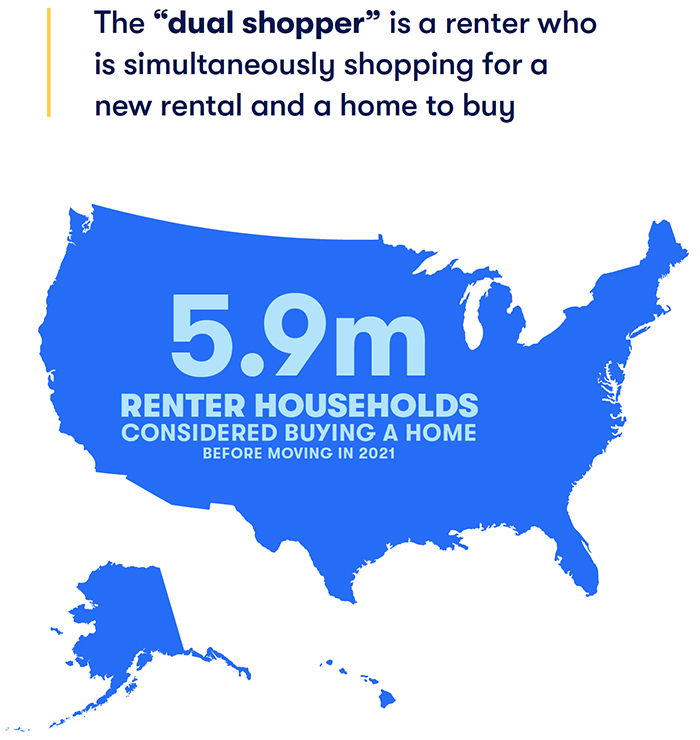This Company Grew Its Business Helping Renters Who Want to Become Homeowners

May 27, 2022
7 Minute Read
Buyers hunting for a home in today’s superheated housing market face such stiff challenges along their journey that millions are hedging their bets by simultaneously shopping for a home to buy and a home to rent.
These “dual shoppers” — who account for millions of renters in the United States — represent an enormous opportunity for multifamily rental property owners to potentially lengthen renter tenure and the amount of rent per room, while providing the flexibility these shoppers need to transition to the next stage of their lives.

The Zillow Consumer Housing Trends Report 2021 found that a whopping 70% of renters say they’re considering moving again within the next three years. Among renters who moved in the last year, 56% said they considered buying when they were looking for a home to rent, and 39% of renters who plan to move in the next year say they plan to buy their next home.
According to the report, 5.9 million U.S. renter households who moved in the past year say they considered buying a home during their search — with 2.37 million of those renters saying they gave it serious thought.
Their desire to become homeowners, however, is being thwarted by some of the most challenging market conditions on record. U.S. home values rose an astonishing 32% from 2020 through 2021. The price gains have been driven mainly by an imbalance between supply and demand: there’s record-low inventory at a time when millennial buyers are reaching peak home buying age and downsizing baby boomers are hunting for homes after accelerating their retirement plans during the pandemic.
Remote workers no longer tied to a workplace have further juiced demand as they seek out homes better suited for their work-from-home lifestyles. Meanwhile, builders are still playing catch-up after more than a decade of underbuilding.

The housing market is expected to remain tough for home buyers
The brutal conditions for buyers are expected to produce another year of eye-popping growth in home values. Zillow economists predict that values will increase at least 16% year-over-year by December 2022.
The record-breaking price growth, coupled with double-digit rent hikes, has made saving for a down payment especially difficult for first-time buyers. As a result, the share of new buyers dropped from 45% in 2019 to 37% in 2021, according to a Zillow survey of recent buyers.
Still, the challenges posed by the current market haven’t stopped people from wanting or needing to move.
Zillow research shows that most people move because of momentous life changes such as graduation, marriage, new jobs and the arrival of children. The question then becomes: How difficult is that move going to be?
Berger Rental Communities, a multifamily property management company that owns and operates apartment communities in Pennsylvania, Delaware and Maryland, is answering that question head-on with a host of flexible rental options that form the core of its marketing campaign: renting shouldn’t be hard.®
Berger caters to dual shoppers with flexibility and predictability
Berger understands that many of its renters want to own homes but can’t swing it for a host of reasons. So the company decided in 2016 that it made sense to cater to those customers, and list their properties on Zillow, where shoppers can simultaneously search for rentals and homes for sale.
The company said its empathetic, data-driven approach is paying off with increased revenue and extended renter tenure.
“Our ‘renting shouldn’t be hard’ initiative centers our business model around our customers’ needs instead of our business needs,” said Brian Miller, Berger’s vice president of brand strategy who has been with the company since 2015 and an industry veteran since 2009. “It’s really just focusing on the pain points. What is it that people don’t like about the rental experience and how do we make that better? For us, it was about what was broken, and developing around that.”
Miller said the company’s embrace of flexibility and predictability as a value proposition is rooted in data that shows how much of a struggle it is for renters who are caught in a holding pattern while they wait to buy.
The 'renting shouldn’t be hard' campaign offerings read like a list of solves for the pain points revealed by data. Among the highlights: no strict lease timelines, no restrictions on pet size, and the ability to rent out units on Airbnb at the majority of their communities.
They also specifically empower renters to become buyers through their “Home Purchase Freedom” program. “We offer Home Purchase Freedom so our residents are allowed to rent with us and break their lease, fee-free at any time to buy a house. The resident gives us 60 days notice and works with a licensed partner,’’ Miller said.
In addition to Home Purchase Freedom, the renting shouldn’t be hard plan includes sweeteners that provide flexibility for prospective renters and would-be buyers at most locations, including:

- The ability to transfer to a different sized apartment or a different rental community within Berger’s network at any time in the lease without paying a fee. The lease would restart with the transfer.
- Permission to rent out their apartment on Airbnb to generate income, which could help renters save for a down payment more quickly or cover moving costs.
- Flexible security deposit alternative that allows residents to avoid the upfront costs of moving by paying a one-time, non-refundable fee as low as $199 when they move in instead of the traditional security deposit.
- A 30-day guarantee that allows residents to try out an apartment for 30 days. If they're not happy with it, they can give 30 days' notice within that period, and they won't need to pay a fee to break their lease.
- Pets of any weight are allowed.
- Residents who need to move more than 50 miles away for a job change, job loss, military service or hospice care don't need to pay a fee to break their lease.
Additional benefits offered by Berger include automatic payments, online leasing and service requests, discounts for buying or renting furniture, and — depending on location — amenities like 'smart' locks, thermostats and lighting.
Residents who move out to buy a home stay longer
Providing a liminal space for would-be homeowners has already shown results for Berger, Miller said.
According to Berger’s data, residents who moved out to buy a home stayed for an average of about 2 years and 9 months — seven months longer than residents who moved for a different reason. Miller said the metric has continued to tick up every year.
Since adopting the program, the company also has boosted its ratings as a management company and an employer. It was rated number two in the country by SatisFacts for management companies with 25+ communities in their Annual Resident Satisfaction Survey for 2021. And Apartment Ratings ranked it as the number one management company.
“There are many factors that contribute to that,’’ Miller said, “but any company who is that understanding of their residents and wearing that out in the open versus making exceptions, really goes a long way.”
Berger also ranks high in employee satisfaction, coming in eighth for “Best Places to Work in Multifamily® by Multifamily Leadership in 2020.
Berger’s programs reflect the realities of people’s lives

Focusing on pain points and resident experiences has helped Berger continue to evolve, and could similarly help other property management companies improve lead flow and quality, and increase resident tenure, Miller said.
Berger started by identifying what people didn’t like about the rental experience, and innovating around how it could make that experience better, he said. As time went on, the company incorporated feedback from residents, and examined lead flow and renewals to see how the changes were affecting residents’ experiences and the bottom line.
They also took what they were already doing, such as referring residents to real estate agents in their network, and brought the elements together into a single marketing plan for dual shoppers. The fact that their customer would be looking to exit once they found a home was all part of the plan.
“Many times, when I talk to peers in the industry about these concepts, there’s a fear of loss:
loss of residents, loss of revenue,’’ Miller said. “But we’ve found this hasn’t been the case. You’re accommodating renters when they need to make changes in their lives. Your renters aren’t going to dislike you. At worst, they move out and tell everyone about how awesome it was.”
Highlights from the Berger case study are available by downloading this PDF.
Connect with us!
Learn how Zillow Rentals can help you reach your goals.
Stay informed. Stay ahead.
Access exclusive industry insights, market trends, and expert tips. Subscribe now to receive quarterly Zillow Rentals newsletters!